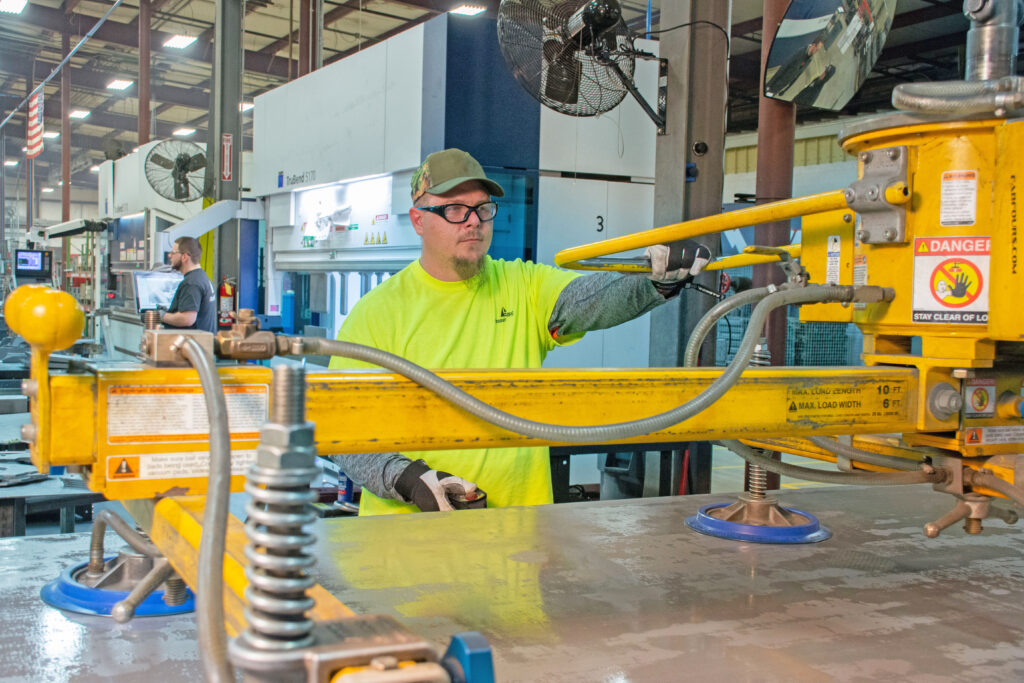To become a machine operator, pursue a vocational training program and gain hands-on experience. Many employers may require a high school diploma or equivalent.
Becoming a machine operator can be a rewarding career for those who enjoy working with technology and machinery. Machine operators are responsible for setting up, operating, and maintaining various types of equipment to ensure efficient production processes. To become a machine operator, individuals should consider pursuing a vocational training program that offers courses in machine operation and maintenance.
Some employers may require a high school diploma or equivalent, and gaining hands-on experience through internships or apprenticeships can also help individuals develop the necessary skills for this role. With the increasing demand for skilled machine operators, pursuing a career in this field can offer stable employment opportunities and a chance to work in various industries.
Getting Started
If you’re interested in pursuing a career as a machine operator, getting started is the first crucial step. This involves conducting thorough research about the role and understanding the requirements to ensure you are well-prepared for the opportunities that lie ahead. In this section, we will explore the key aspects of getting started in becoming a machine operator.
Researching the Role
Before diving into any career path, it’s essential to conduct in-depth research to gain a comprehensive understanding of the role. As a machine operator, your primary responsibility will be to set up, operate, and monitor various machines used in manufacturing processes. To excel in this role, you must possess a solid understanding of the machinery you will be working with. It’s crucial to research the different types of machines, such as milling machines, lathes, or CNC machines, to gain familiarity with their functions and operations.
Understanding the Requirements
To become a machine operator, there are specific requirements that you need to meet. These requirements may vary depending on the industry or company you aspire to work in. Generally, employers look for candidates who have completed a high school diploma or equivalent. Additionally, having technical training or certifications in machine operation will provide you with a competitive edge in the job market. It’s also important to have strong problem-solving skills, attention to detail, and the ability to work well under pressure.
By conducting thorough research and understanding the necessary requirements, you will have a clear roadmap to follow in your journey to becoming a machine operator. Remember, dedication, continuous learning, and hands-on experience are key elements that will help you excel in this rewarding career.
Education and Training
To pursue a career as a skilled machine operator, obtaining the right education and training is essential. Whether you have a high school diploma or are considering vocational training programs or apprenticeships, here is how you can kickstart your journey:
High School Diploma or Ged
Completing your high school diploma or GED is the first step towards becoming a machine operator.
Vocational Training Programs
Consider enrolling in vocational training programs tailored for machine operations to gain hands-on experience.
Apprenticeships
Participating in apprenticeships allows you to learn under experienced professionals while earning practical skills.
Also Read: How to Become a Plug
Acquiring Skills
Operational Knowledge
To become a machine operator, understand the operational processes
Equipment Maintenance
To excel, maintain equipment regularly for efficient performance.
Quality Control
Adhere to strict quality control measures for precision in operations.

Credit: www.spherion.com
Gaining Experience
In this blog post, we will discuss the various steps and aspects of becoming a machine operator. In particular, we will focus on gaining experience, which is essential to excel in this field. Gaining hands-on experience through entry-level positions and on-the-job training is crucial for aspiring machine operators. Let’s get started!
Entry-level Positions
When starting your journey to becoming a machine operator, it’s common to begin with entry-level positions. These positions are designed to provide you with a foundational understanding of the industry and the machines you will be working with.
Entry-level positions can be found in various industries, such as manufacturing, construction, and logistics. These positions allow you to observe and learn from experienced machine operators, giving you a taste of the work environment and the tasks involved.
While the responsibilities in entry-level positions may be less complex compared to more senior roles, they offer an invaluable opportunity to gain practical experience and familiarize yourself with the basics of machine operation.
On-the-job Training
On-the-job training is a critical component of becoming a skilled machine operator. It provides you with the practical knowledge and skills required to operate different types of machinery effectively and safely.
During on-the-job training, you will be guided by experienced operators who will teach you how to operate the machines, perform routine maintenance, and troubleshoot any issues that may arise.
This hands-on learning approach allows you to develop a deep understanding of the machines you will be working with. You’ll gain insights into safety protocols, how to interpret technical manuals, and how to make necessary adjustments to ensure optimal machine performance.
In addition to technical skills, on-the-job training also emphasizes the importance of critical thinking, problem-solving, and attention to detail. These qualities are essential for a machine operator, as they help ensure smooth machine operation and minimize the risks associated with equipment malfunction.
Keep in mind that on-the-job training may vary depending on the industry and the specific machines you will be working with. However, the core focus remains the same: equipping you with the necessary skills and knowledge to become a proficient machine operator.
Building Professional Network
Building a professional network as a machine operator is essential for career growth and skill development. Connecting with industry experts, peers, and mentors can provide valuable insights, opportunities, and support. Here are some effective ways to expand your professional network:
Industry Events
Attending industry events such as trade shows, conferences, and workshops can provide valuable networking opportunities for machine operators. Engage with industry professionals, participate in discussions, and exchange contact information to build connections and stay updated on the latest developments in the field.
Mentorship Opportunities
Seeking mentorship from experienced machine operators can provide valuable guidance and support in navigating the industry. Look for mentoring programs, connect with established professionals, and learn from their experiences to enhance your skills and expand your knowledge base.

Credit: www.resourcemfg.com
Certifications and Licenses
Obtaining the necessary certifications and licenses is a crucial step on the path to becoming a machine operator. These credentials not only demonstrate your competence but also ensure compliance with industry standards and regulations.
Osha Certification
The Occupational Safety and Health Administration (OSHA) Certification is a fundamental requirement for machine operators. This certification ensures that individuals have the knowledge and skills to maintain a safe and healthy work environment.
Forklift Operation License
Obtaining a Forklift Operation License is essential for machine operators who will be operating forklifts as part of their duties. This license validates your ability to safely operate and maneuver forklifts, minimizing the risk of accidents or injuries in the workplace.
Seeking Employment
Once you have prepared a compelling resume, you are ready to begin your job search. This section will guide you through the process of seeking employment as a machine operator, with a focus on resume preparation and effective job search strategies.
Resume Preparation
One of the key steps in landing a machine operator job is preparing a resume that highlights your relevant skills and experiences. Follow these tips to create an impactful resume:
- Start with a strong resume objective statement that clearly states your career goals and emphasizes your interest in machine operation.
- List your relevant skills, including technical skills such as machine setup and operation, troubleshooting, and quality control.
- Include any relevant certifications or training you have completed, such as a CNC machine operator certification.
- Showcase your work experience, including any machine operation roles you have held in the past. Be sure to highlight your achievements and responsibilities in these positions.
- Highlight your attention to detail and ability to work in a fast-paced environment, as these are crucial skills for machine operators.
- Use bullet points to organize your information and make it easy to read for potential employers.
By following these resume preparation tips, you will increase your chances of capturing the attention of hiring managers and securing an interview.
Job Search Strategies
Once your resume is ready, it’s time to embark on your job search. Consider the following strategies to enhance your chances of finding a machine operator position:
- Utilize online job boards: Make use of popular job search websites to find machine operator job listings. Regularly check these platforms for new opportunities.
- Network: Reach out to your professional contacts, such as friends, family members, and former colleagues, to let them know you are looking for a machine operator position. They may be able to provide leads or recommendations.
- Attend job fairs: Job fairs are an excellent way to connect with potential employers directly. Prepare your resume and dress professionally to make a lasting impression.
- Explore industry-specific websites: Some industries have specialized websites that cater to job seekers in their field. Research if there are any platforms specifically for machine operators and take advantage of these resources.
- Reach out to staffing agencies: Staffing agencies often have connections with companies looking to hire machine operators. Submit your resume to relevant agencies and inquire about available openings.
By implementing these job search strategies, you will increase your chances of finding suitable machine operator positions and securing interviews with potential employers.

Credit: www.halpinservices.com
Advancing Your Career
Becoming a skilled machine operator opens up opportunities for career growth and advancement.
Specialization Opportunities
Specializing in specific types of machines or industries can enhance your expertise.
- Focus on advanced machinery for a niche market.
- Take specialized training courses to broaden your skill set.
- Stay updated on the latest technological advancements in the field.
Leadership Roles
Transitioning into leadership positions can further propel your career as a machine operator.
- Demonstrate strong leadership qualities in your current role.
- Seek out supervisory or managerial positions within the organization.
- Lead training sessions for new machine operators to showcase your expertise.
Conclusion
In a rapidly evolving industrial landscape, becoming a machine operator is a promising career choice. By following the necessary steps, such as acquiring relevant education and training, honing technical skills, and gaining experience, you can position yourself for success in this field.
Emphasizing safety, adaptability, and a willingness to learn will set you apart as a competent and sought-after machine operator. As industry demands continue to increase, the opportunities for growth and advancement in this profession are abundant. So, take the first step towards becoming a machine operator and embark on a rewarding career journey today.
